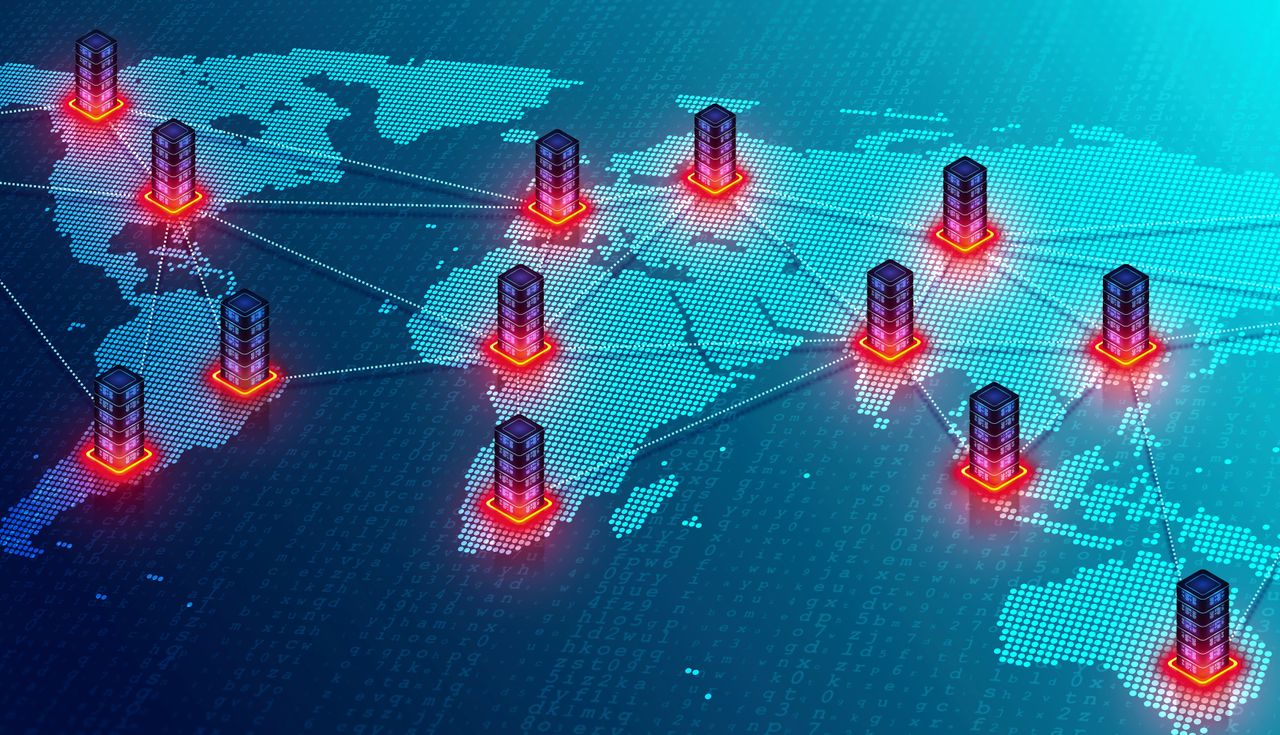
Proxy services are perfect for rerouting your internet traffic privately, allowing you to bypass geo restrictions, anonymously examine a competitor, or purchase multiple restricted tickets for an event. But all of this shouldn't cost the world.
That's where the cheapest proxy services come in. They work by routing your internet traffic through a computer or server in a different location, tricking the site you are viewing into thinking you are based in a different location and hiding your IP in the process.
Our experts have tested several cheapest proxy services to find their pros and cons, examining their speed, security, server options and locations, number of IPs available, encryption, SOCKS5 support, and their price and ease of use to determine the best cost-to-feature ratio.
We have also looked at the best proxy sites services and the best residential proxy service. But here are our top picks for the cheapest proxy services.
We've also rate the best VPN services.
The cheapest proxy services of 2025 in full:
Cheapest proxy overall
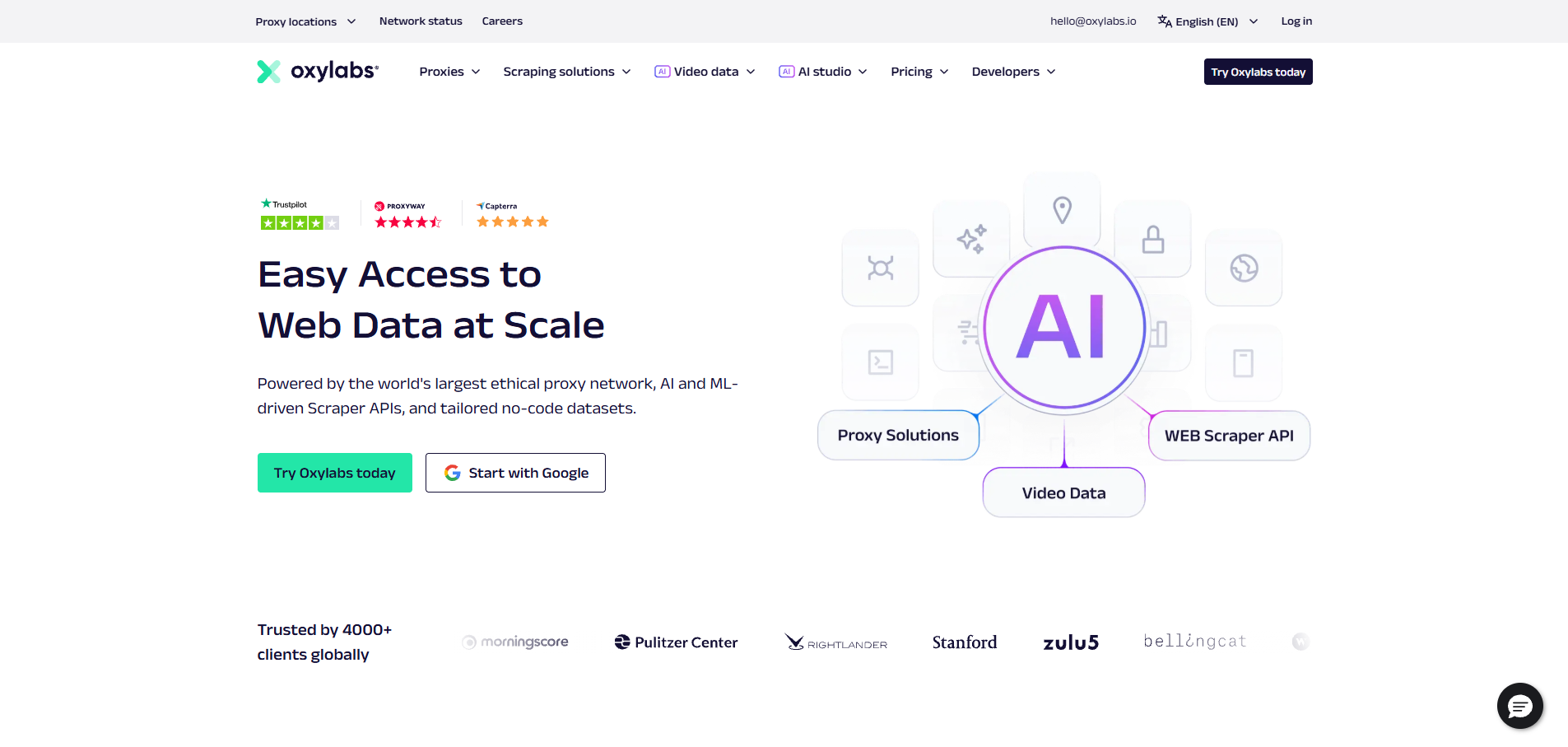
Oxylabs is one of the big guns in the proxy provider space. While their pricing and product portfolio is designed for large consistent proxy users, the Pay As You Go option is a good entry point for small time users.
The pricing plan, which is available for their residential and mobile proxies, involves paying only for the traffic you use, without a monthly subscription. You can purchase a specific amount of traffic, starting from 1 GB, and use it as needed, with the option to top up your account when you run out. This allows for flexibility and cost-efficiency, especially for users with fluctuating traffic needs.
A GB of data costs $4 for residential proxies, and $9 for mobile proxies, with this option. But unlike the monthly subscription plans, you don’t need to commit to a certain amount of data. You may purchase up to 50 GB each month, and any unused GB will roll over into the following month.
It can be more cost-effective than a subscription if you don't consistently need a large amount of traffic, since you pay a fixed rate per gigabyte of traffic used. You can run as many concurrent sessions, and can monitor your traffic usage and manage your spending through the Oxylabs dashboard.
Read our full Oxylabs review.
Cheapest proxy for global coverage
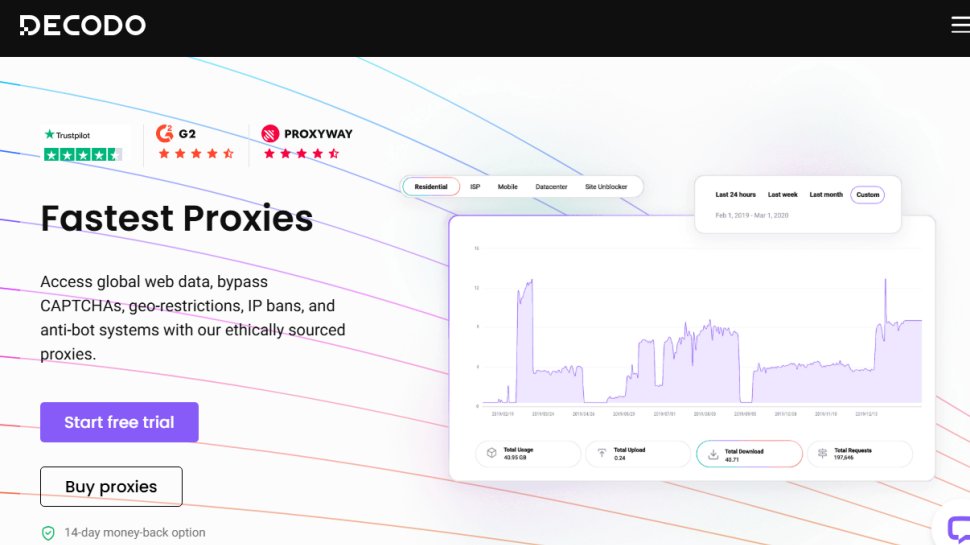
Decodo offers a range of subscription options to match the needs of every user. If you are working on a short-term project, their Pay As You Go payment plan is a good option to look at. This plan gives you access to their vast pool of residential and mobile proxies without committing to a monthly subscription.
With Pay As You Go, you pay only for the data you use. Residential proxies are priced at $3.5/GB, while mobile proxies cost $8/GB. Data is purchased in single-gigabyte increments, and the system automatically adds another gigabyte once you've used 90% of your current one.
Along with access to the millions of IPs, you get support for SOCKS5, and the ability to run unlimited threads and concurrent sessions. One of the standout features of this plan is that any unused data remains valid for up to 12 months, giving users ample time to use what they've paid for.
To use Pay As You Go, you'll need to top up your Decodo Wallet first, as this payment method is exclusively supported through wallet funds. It's also important to note that you can’t use this plan alongside a standard monthly subscription—you’ll need to choose one or the other.
All things considered, the pay as you go payment plan is perfect for one-off tasks, or unpredictable workloads. That said, it may cost more than a subscription if you regularly need high GB volumes. So if your project demands steady, high-volume traffic, prepaid monthly bundles may offer better per-GB pricing.
Read our full Decodo review.
Cheapest proxy for mobile ISPs
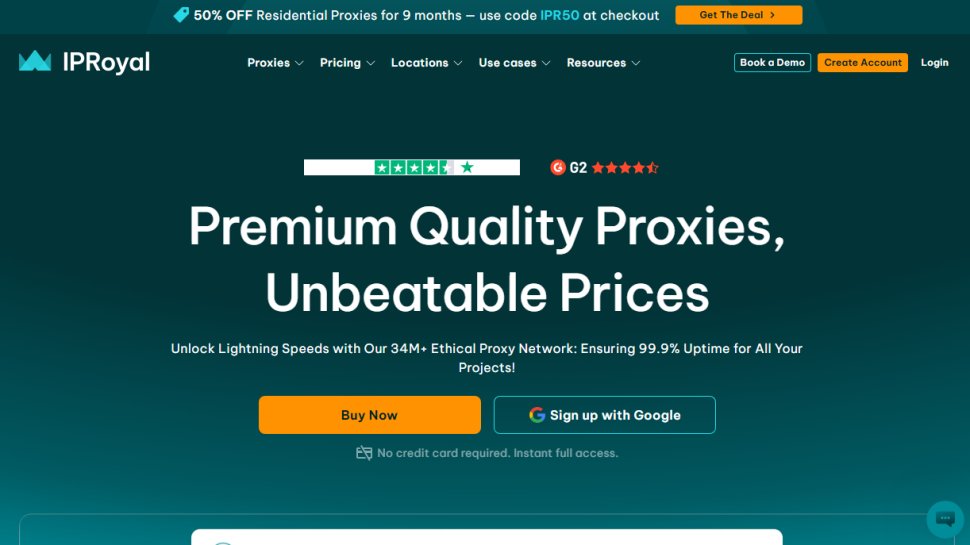
IPRoyal offers access to over 34 million IPs, making it a reasonably popular choice among proxy providers. The company is based in the United Arab Emirates and supports a range of proxy types, including datacenter, residential, ISP, and mobile proxies (3G/4G/5G) across just over 40 countries.
Where IPRoyal stands out most is its pricing. The service frequently promotes discounts and, at the time of writing, is offering 50% off select plans. Its 10GB residential proxy plan, for example, is priced at $2.63/GB with a subscription, or $2.76/GB on a pay-as-you-go basis. The latter payment scheme is ideal for those with fluctuating workloads.
Datacenter proxies are available at $1.57/proxy for 30 days, or slightly cheaper at $1.39/proxy when committed to a 90-day plan. Mobile proxy pricing ranges from $10.11 for a one-day plan to $117/month if prepaid for 90 days. Similarly, its ISP proxies start from $2/proxy in the 24 hour package.
The pricing model is geared toward scalability, as the more you buy, the lower the unit cost. The fact that data doesn’t expire for rotating residential proxies, and that you get unlimited bandwidth and threads for the datacenter, ISP, and mobile proxies, adds more value to its pricing tiers.
However, there are some trade-offs. IPRoyal’s IP pool is smaller than those of larger providers, which may limit options for users needing broader geographic coverage or more specialized configurations. Support is also limited as there’s no phone support, and the absence of a free trial makes it harder for you to evaluate the service without upfront payment.
Overall, IPRoyal seems best suited for budget-conscious users or those looking to test and scale proxy use without committing to long-term contracts. While it may not match the scale or polish of premium competitors, it offers a practical, affordable option for many common use cases.
Read our full IPRoyal review.
Cheapest proxy with a free tier
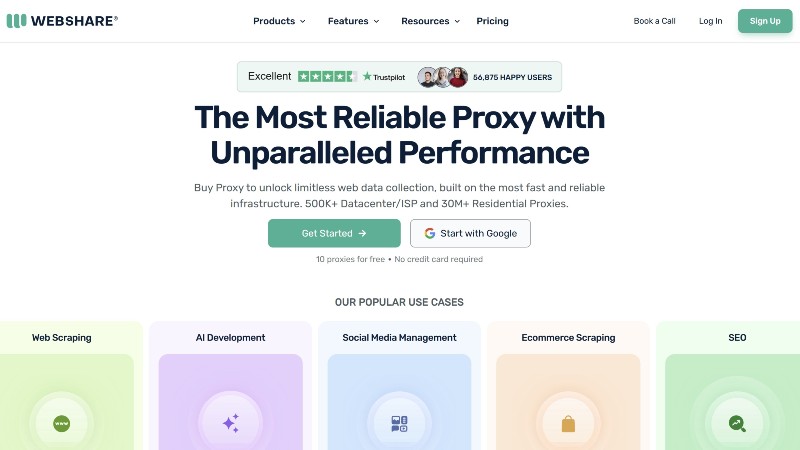
WebShare offers some of the most affordable options in the proxy market. Whether you need datacenter, static residential, or rotating residential proxies, WebShare allows you to tailor your plan, selecting a specific number of IPs, and bandwidth limits. As your needs grow, their volume pricing scales down the cost per IP or GB of bandwidth.
Their pricing start with shared datacenter proxy plans priced at $2.99 per month for 100 IP/250 GB, while the static residential proxies start at $6/month for the 20 proxies packages. Similarly, the rotating residential proxies, which are priced on bandwidth are available at $3.5/GB, dropping to as low as $1.4/GB on larger plans. And if you commit to yearly plans, you’ll save an additional 30%-50% on the price on all the three proxy offerings.
On top of this, you can start using WebShare with its free plan that offers 10 proxies and 1 GB of monthly bandwidth, which is a good way to evaluate basic functionality before spending any money. You can use these free proxies forever since they don’t have a time cap.
One of Webshare’s standout features is its strong commitment to user privacy. The company emphasizes that it does not share user information or proxy activity with any third parties. Additionally, it encrypts all proxy traffic by default, which adds another layer of security that protects data during transmission and helps prevent unauthorized access.
That said, Webshare’s network is more limited compared to some premium providers, offering access to just over 80 million IP addresses across slightly more than 45 countries.
Support is another area where the service could improve. Currently, assistance is mostly restricted to written documentation, which may fall short for users who require more responsive or hands-on support.
Read our full Webshare review.
Cheapest proxy for scaling
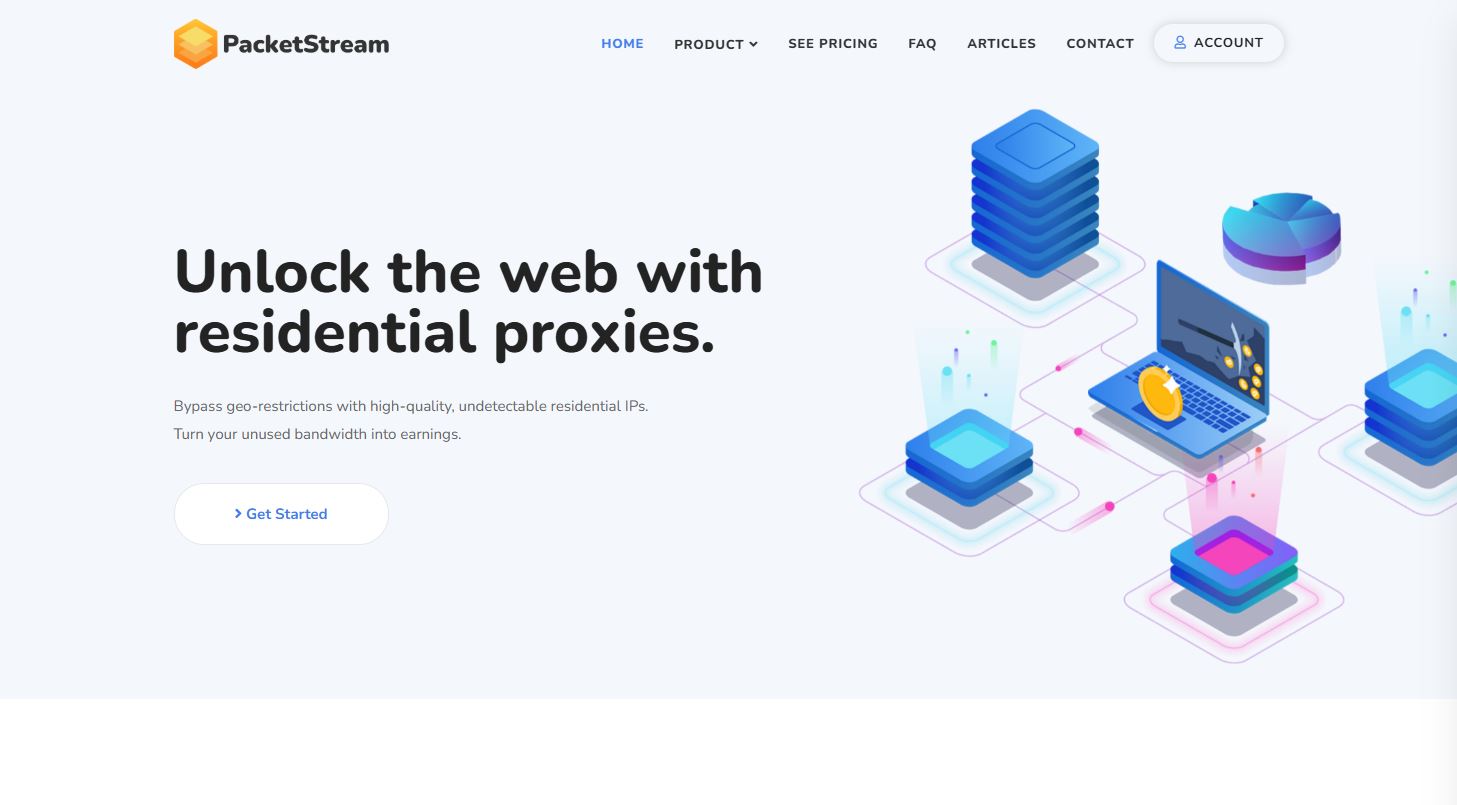
Unlike many proxy services that offer multiple proxy types, PacketStream focuses solely on residential proxies. One of its most appealing aspects is that unlike the complex tiered plans of most of its peers, it has a straightforward and flat rate of $1 per GB of bandwidth. This pricing grants full access to its residential proxy network, with support for both HTTP and SOCKS protocols.
You can choose between randomized IPs that rotate with every request, or opt for sticky sessions, depending on your specific needs. This level of control is helpful for various use cases, from simple scraping tasks to more session-sensitive uses like account creation.
That said, there is a minimum purchase requirement of 50GB, meaning you'll need to spend at least $50 to get started. While this might be a barrier for casual users or those testing the service, on a per-GB basis, PacketStream remains one of the most competitively priced residential proxy providers in the market.
A notable feature of PacketStream is its bandwidth-sharing model, which allows users to sell their unused internet bandwidth back to the platform at $0.10 per GB, with a minimum payout threshold of $5. This gives users an opportunity to earn passively while contributing to the proxy network.
However, there are a few limitations worth noting. PacketStream does not publicly disclose the size of its IP pool or the specific countries its proxies originate from. While users can select a target location within the platform, the lack of upfront transparency seems odd.
Although PacketStream does offer a free trial, access requires contacting the sales team for approval. Additionally, customer support is only available via email, which can be inconvenient if you need quick assistance.
Read our full PacketStream review.
Cheapest proxy for unlimited bandwidth
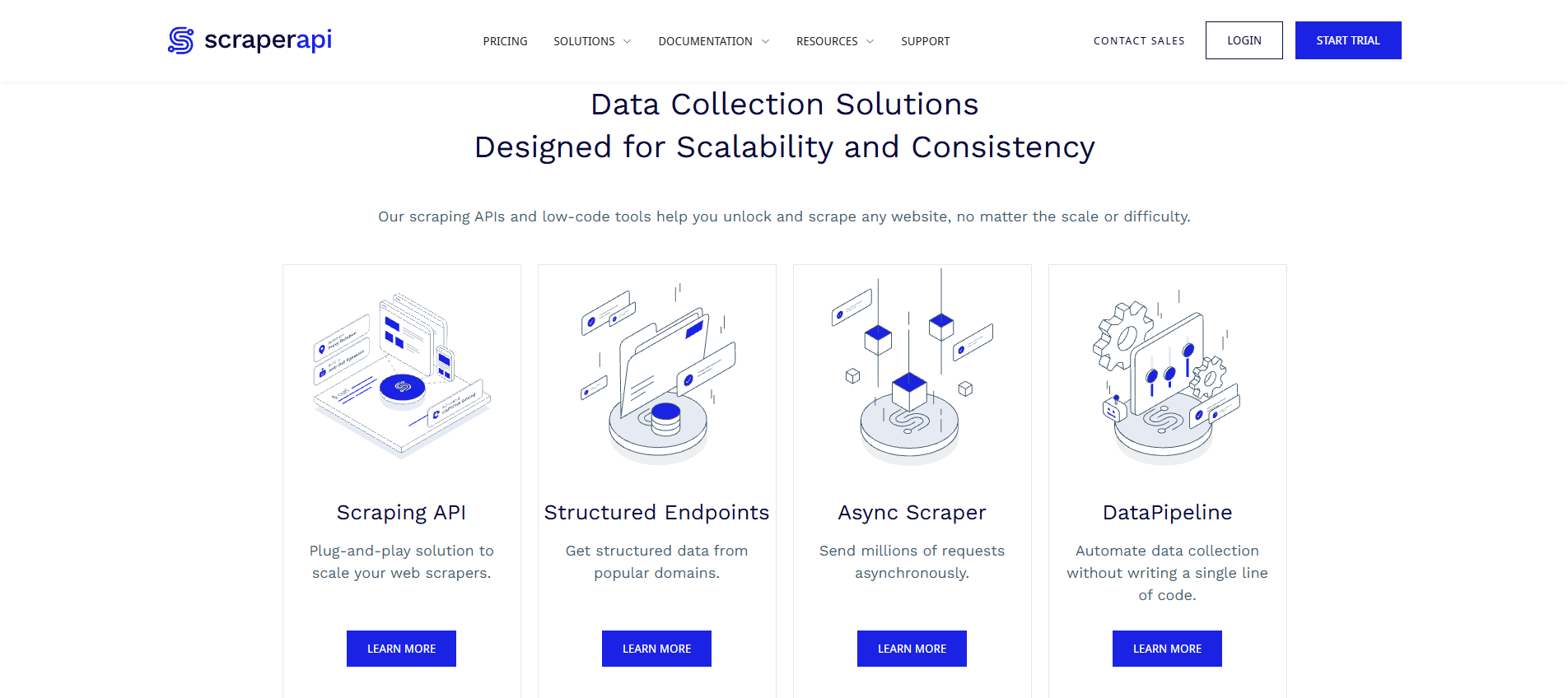
You can use proxy services for a variety of purposes. But if web scraping is your goal, ScraperAPI offers one of the most cost effective means for doing so.
Most proxy providers charge users based on the amount of bandwidth they use. In contrast, ScraperAPI charges users based on their use of API credits. Every time you make a scraping request, you consume credits.
The amount of credits you consume depends on the domain and parameters you add to your scraping request. For instance, while normal requests cost one credit, requests to Amazon cost 5. Similarly, requests to Google and Bing and their subdomain cost 25 credits, while requests to LinkedIn cost 30 credits. The platform has an API Playground that you can use to understand the cost of a particular request before you run it.
Furthermore, ScraperAPI charges credits only for successful requests. If a request is blocked or fails, it's not deducted, which helps avoid wasted spend—unlike flat-rate bandwidth charges elsewhere.
ScraperAPI’s Hobby tier costs $49/month and offers 100k credits, which is enough for most small use‑cases. It allows users to run 20 concurrent threads, but only offers US and EU IPs. New users also get 5000 credits that they can trial for a week, and there’s also a free plan that gives 1000 free API credits every month.
Cheapest proxy for ISP targeting
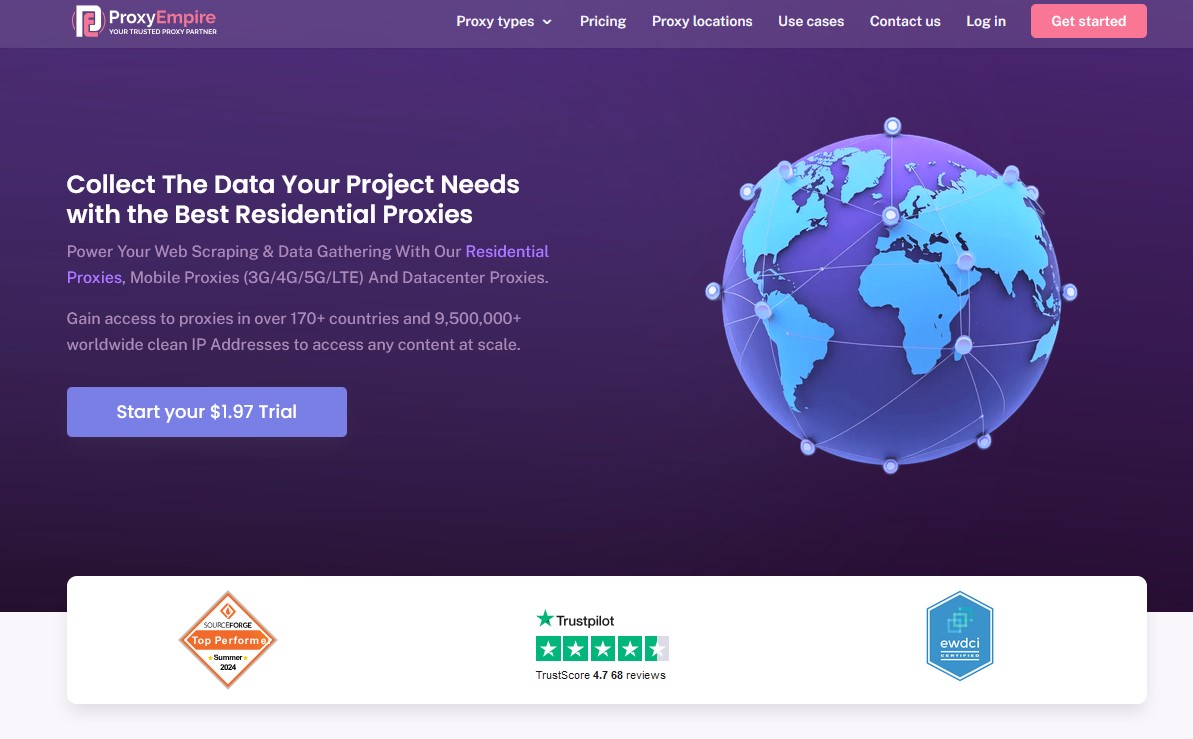
ProxyEmpire stands out as a cost-effective proxy provider due to a blend of solid pricing, and a good balance of features. It has a reasonable network of more than 9.5 million IPs that span over 170 countries, which it claims ensures high success rates and reliable access across varied locations.
The entry-level access to its proxy network starts with a tiny paid trial that costs $1.97 and gets you 100MB of residential proxies and 50MB of mobile IPs. So while it’s not exactly free, for under $2 you get just enough bandwidth to test the service before committing to a larger plan.
ProxyEmpire’s paid plans start with a Pay‑As‑You‑Go plan where rotating residential proxies go for $7/GB, and rotating mobile proxies for $9/GB. With these plans you can use the service without a monthly commitment, and only pay only for how much bandwidth you need.
Once you are ready to take the plunge, you can switch to one of its monthly packages that offer significant per‑GB savings as usage scales. For instance, rotating residential plans drop from $5.71/GB with the 7GB Starter plan to $3/GB with the 1TB Enterprise plan. Rotating mobile plans echo the pattern dropping from $8.33/GB in the 6GB Mobile A plan to $4.00/GB in the 1000GB Mobile 1000 GB plan.
The good thing about ProxyEmpire plans is that the unused data is automatically carried over to the next month, so you’re never paying for unused bandwidth. It supports all popular protocols including SOCKS5. ProxyEmpire also doesn’t limit the number of threads on any of their proxy types, so you can use as many concurrent sessions as you need.
The highlight however is its wide range of targeting options that are available for even the lowest rotating residential and rotating mobile proxies. You can target individual countries, states, regions, cities, as well as ISPs and mobile carriers.
Cheapest proxy for uptime
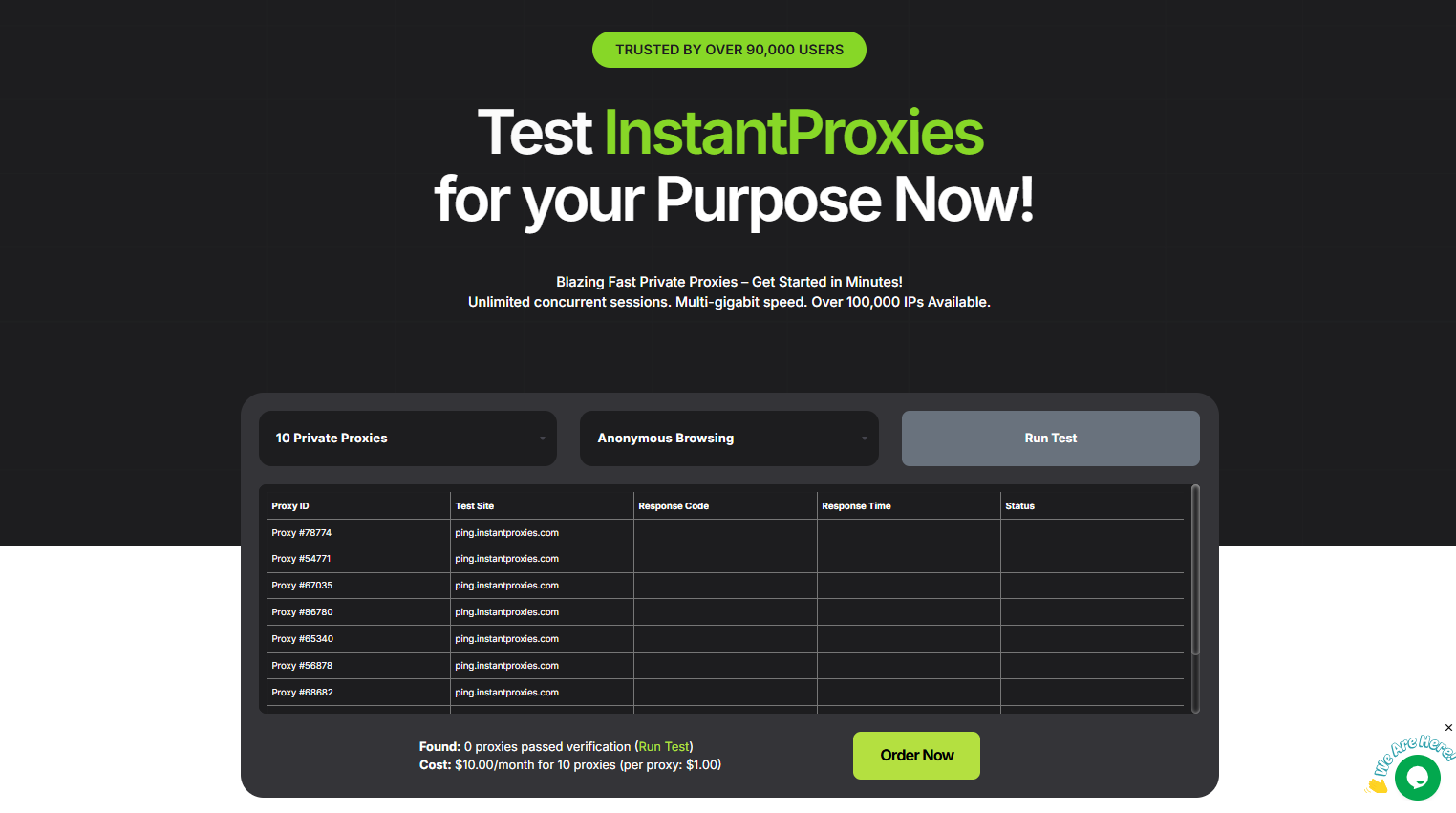
InstantProxies offers private datacenter proxies at just $1 per proxy per month, which makes it one of the cheapest options available.
The price per proxy stays constant across its pricing tiers, from its basic plan of 10 proxies for $10, all the way up to the $500/month that offers 500 proxies.
All plans also include unlimited bandwidth and it doesn’t place any restrictions on the number of concurrent connections, which is a definite plus. What does change however with each plan is the number of cities, and subnet. For instance, the $10/month plan includes two cities and four subnets, while the top tier $500/month plan offers seven cities and fourteen subnets.
InstantProxies has a pool of over 100,000 IPs that it claims offers multi-gigabit speed. The best thing about InstantProxies is that it promises 99.99% uptime. The service has a public proxy tester that you can use to test the speed of the proxies for different tasks, and websites.
Another highlight of the service is that it assigns private proxies to all its users, which are fast, and perform far better than shared proxies, which is what you’ll get with most of its peers at this price point. If you want, you can request new proxies once every month at the time of renewal.
That said, there are some drawbacks to the service as well. For starters, its geographic reach is somewhat limited compared to some of its peers. InstantProxies says it has servers all over the US, and Europe, and several parts of Asia. The service also doesn’t offer a free trial of its proxies, and its support options are fairly limited as well.
All things considered, thanks primarily to its low cost, InstantProxies is ideal for individuals, small businesses, and scrapers that need budget-friendly yet performant proxies. The simple pricing model, unlimited bandwidth, and concurrent connections, make it ideal for all kinds of web scraping workloads.
How to pick the cheapest proxy service
1. Are all cheap proxies unsafe or unreliable?
While some of them are cheap because of their low quality network, the same isn’t true for all of the cheap options. Some providers, like the ones we’ve covered above, offer competitive prices by focusing on specific services (such as only residential proxies). Always test wherever possible, and stay clear of services with vague policies or poor reviews.
2. What should I look for in a low-cost proxy provider?
Even though you are on the hunt for the cheapest proxy provider, always look for a balance between affordability and functionality.
Here are some of the things you should consider:
- Type of proxy services offered including residential, datacenter, mobile.
- The pricing model (whether per GB, per proxy, or pay-as-you-go)
- Bandwidth limits and concurrency options
- IP pool size and geographic coverage
- The success rate and reliability
- Protocol support (HTTP/S, SOCKS5)
3. Should I choose pay-as-you-go or a subscription model?
Pay-as-you-go is ideal for occasional or unpredictable use. It’s also best for testing services that don’t offer a free or limited trial.
On the other hand, subscriptions are better for consistent, high-volume needs and often offer lower per-GB or per-proxy costs.
4. How important is IP pool size and location variety?
It depends on your use case. If you need geo-targeting or large-scale scraping, a larger, globally distributed IP pool will definitely be beneficial. However, for basic tasks, a smaller, but reliable pool will work just fine.
5. Do cheap proxies support rotating and static IPs?
Many of them do, but not all. Rotating IPs are better for scraping, while static IPs work well for login-based or session-sensitive tasks. Some providers offer both in the same plan, while some offer them separately.
6. Is there a risk of getting blocked more often with cheap proxies?
Yes, that’s a credible threat, as some budget providers tend to recycle IPs more frequently, which often flags anti-bot mechanisms, especially on popular websites. This is why it’s imperative to test the proxy service before you subscribe to its paid plans.
7. What’s the safest way to test a cheap proxy provider?
Keep a small testing project handy, and start with providers that offer either free trials or low-cost starter pay-as-you-go plans.







